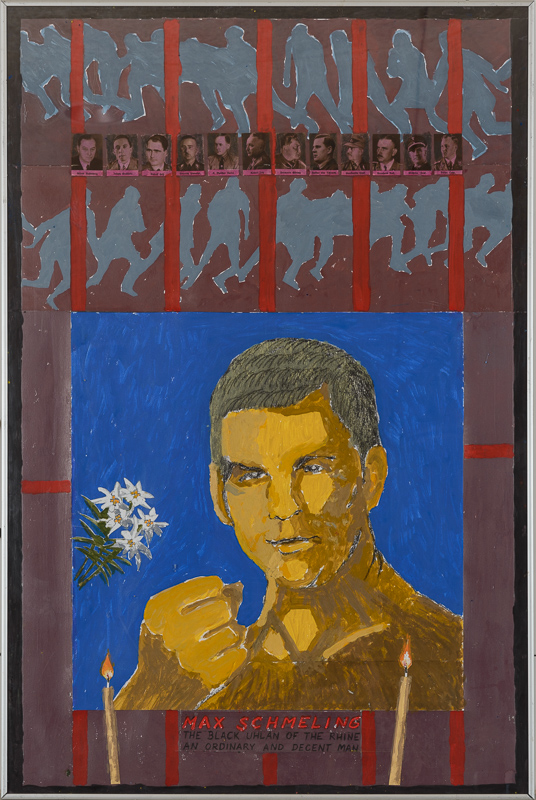.
Max Schmeling

Akryl, akvarel, blyant. Papir, karton.
Max Schmeling var tysk verdensmester i sværvægtsboksning 1930-32. I 1936 blev han igen verdensmester ved at slå den indtil da ubesejrede Joe Louis i New York. Schmeling vendte tilbage til Tyskland som helt, ikke mindst hos nazisterne. Joe Louis var ikke kun amerikaner, han var også sort. I den nazistiske propaganda blev Schmeling fremstillet som nazist, hvad han dog ikke var. I 1938 blev der bokset revanchekamp. Det betragtes som den mest aflyttede radioudsendelse nogensinde i historien – en nazist mod en sort amerikaner. Schmeling tabte på knock-out i første omgang, hvilket af nazi-regimet blev betragtet som en national ydmygelse og han blev upopulær i den tyske befolkning. Ved krigens udbrud blev han indkaldt som faldskærmsjæger. Efter krigen blev han renset for beskyldninger om nazi-sympatier. Han havde under Krystalnatten skjult to jødiske drenge på et hotel og sørget for, at de kom ud af landet. I USA havde han en jødisk manager, som han på opfordring af nazipartiet nægtede at afskedige. Schmeling var en fattig mand da han vendte hjem til Tyskland efter krigen. I USA havde han imidlertid lært en bokse-kommissær at kende, som var direktør hos Coca-Cola. Han sørgede for at Schmeling fik eneretten til salg af Coca-Cola i Tyskland. Han blev en velhavende mand og brugte de fleste af sine penge på velgørenhed. Han blev i øvrigt ven med en fattig og syg Joe Louis, og betalte hans medicinregninger.
Acryl, watercolor, pencil. Paper, carton.
Max Schmeling was German world heavyweight boxing champion from 1930-32. In 1936, he again became world champion by beating the until then undefeated Joe Louis in New York. Schmeling returned to Germany as a hero, not least among the Nazis. Joe Louis was not only American, he was also black. In Nazi propaganda, Schmeling was portrayed as a Nazi, which he was not. In 1938, a revenge fight was held. It is believed to be the most listened-to radio broadcast ever – a Nazi against a Black American. Schmeling lost by a knockout in the first round. This was considered a national humiliation for the Nazi regime and he became unpopular among the German people. At the outbreak of war, he was called up as a paratrooper. After the war he was absolved of accusations of Nazi sympathies. During the Crystal Night, he had hidden two Jewish boys in a hotel and got them out of the country. In the United States, he had a Jewish manager, whom he refused to fire at the request of the Nazi Party. He was a poor man when he returned home to Germany after the war. In the United States, however, he had met a boxing promoter who was also the director of Coca-Cola. He made sure that Schmeling got the exclusive rights to sell Coca-Cola in Germany. He thus became a wealthy man and gave most of his money to charity. Incidentally, he became friends with a poor and sick Joe Louis, and paid his medicine bills.
Acryl, Aquarell, Bleistift. Papier, Karton.